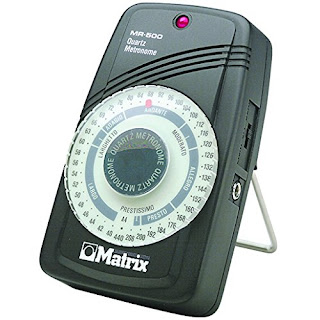I'm Not Your Time Keeper
Today's post reaches a sort of milestone: this is 'Percussion Deconstruction™' #250! When I started writing this blog back in March, 2011, I never imagined I'd still be here nearly 6 years later having written so much. I want to thank readers both old and new, especially anyone who has been here since my first few posts, for reading all my words over these years. Here's to the next 250!
I'm Not Your Time Keeper
Contrary to popular opinion, the drummer is NOT the time keeper of the band. Everyone is. That's right, everyone keeps the time. For all musicians to rely on someone else to provide the time is a very foolish idea. Yet I'm surprised at all the times when someone else in a band I was in, relied on me to be their guide, providing some sort of time measurement (as in the metronome beat), and also some sort of guide as to where they were within the song (as in the song structure of verse/chorus/bridge).
How can people play music without a sense of time?
As a drummer, if you've ever had to work with someone who has no sense of time, it can be a nightmare. Being in a band is essentially a team sport, where everyone has to work together to successfully create the music. When one person has no time sense, it tends to drag everyone else down. I've worked with a few bass players who were all over the place: rushing, dragging, inconsistent. The music never was able to settle into any sort of groove. I was never able to relax, because I had to always try to keep some sort of middle ground beat, just so the music would hang together. Not fun.
Playing with people who are normally solo performers can be the worst experience. When performing solo, you don't have to worry about staying in sync with anyone else, thus some solo performers tend to develop a style that just wanders around: the time speeds up and slows down, and song structure often disappears (“I think I'll just go to the chorus now, even though I'm not done with the verse.”) How listeners will put up with this is beyond me. I remember years ago playing a weekend gig with a person who was a rather legendary singer who had absolutely no sense of time or song structure. It was embarrassing to say the least. I never took a gig with them again.
Repeat after me: The metronome is your friend.
I don't understand why some musicians, especially drummers, are so hesitant to practice with a metronome. Some people say they don't want to sound robotic, but that's a lame excuse, and if you sound robotic, that's more a personal tendency whether with or without a metronome. Working with a metronome is essential for any musician who is serious about their music.
I think part of the whole problem starts with musicians misunderstanding the function of the metronome. Just like the drummer, it is not your time keeper.
You do not follow a metronome, you play along with it.The biggest mistake I see people do is trying to follow a metronome. This doesn't work because you will always be behind the beat. Look at it this way: by the time your ear hears the metronome, then sends the signal to your brain to process, then sends the signal to your limbs to play, that beat is long gone. You are caught up in perpetually being behind.
If you can hear the metronome, you are either ahead or behind.The idea is to play with the metronome. You shouldn't hear it or notice it unless you are out of sync with it. It's the same as playing with other musicians, you don't wait for them, you play along with them. The metronome is no different. When you practice with a metronome, let it play for a bit to establish the tempo. Listen to it and feel it. Then, count off and play along, playing on top of it. If you are in time with it, you shouldn't notice it. If you do notice it, then adjust your playing until you are back in sync. But remember, don't listen for it! When you listen, you get behind, or worse yet, you start to anticipate where it will be and get ahead. Just relax and play like it's not there, only noticing it when you are out of sync.
The same thing goes for click tracks, drum machines, and loops: don't listen for it! Play along with it.
Also, practice at various tempos. The idea is to develop a sense of time within yourself at various tempos. I see too many people who practice everything within a narrow time frame, like 100-120BPM. When they have to play a really slow song, they are in trouble because they have to deal with all the space between the notes and have no real sense of how to experience it. Practice at all different tempos so you can play in time at all different tempos.
When you listen to recordings made in the 1960s and 70s, they didn't use a click track, yet the music is in time and feels good (I'm listening to Led Zeppelin as I write this. Kashmir is now playing. John Bonham is rock solid, yet not robotic. He knew time). All these musicians worked to develop a sense of time. You need to work at it too.
Be mindful of your time.
~ MB
Deconstruct Yourself™





Comments
Post a Comment